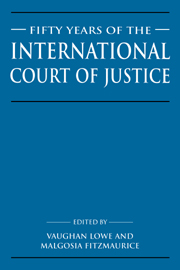Book contents
- Frontmatter
- Contents
- List of contributors
- Preface
- List of abbreviations
- Sir Robert Yewdall Jennings, by Vaughan Lowe
- List of publications of Sir Robert Jennings
- Table of cases
- Part I The International Court of Justice
- Part II The sources and evidences of international law
- Part III Substance of international law
- Part IV Procedural aspects of the work of the International Court of Justice
- 21 Procedural law and the International Court of Justice
- 22 The President of the International Court of Justice
- 23 Nationality of claims: some relevant concepts
- 24 The plea of domestic jurisdiction before the International Court of Justice: substance or procedure?
- 25 ‘Partial’ judgments and the inherent jurisdiction of the International Court of Justice
- 26 Intervention before the International Court of Justice
- 27 The use of Chambers of the International Court of Justice
- 28 The use of experts by the International Court of Justice
- 29 Provisional measures
- 30 Remedies in the International Court of Justice
- 31 A comment on the current health of Advisory Opinions
- Part V The International Court of Justice and the United Nations
- Index
28 - The use of experts by the International Court of Justice
Published online by Cambridge University Press: 02 November 2009
- Frontmatter
- Contents
- List of contributors
- Preface
- List of abbreviations
- Sir Robert Yewdall Jennings, by Vaughan Lowe
- List of publications of Sir Robert Jennings
- Table of cases
- Part I The International Court of Justice
- Part II The sources and evidences of international law
- Part III Substance of international law
- Part IV Procedural aspects of the work of the International Court of Justice
- 21 Procedural law and the International Court of Justice
- 22 The President of the International Court of Justice
- 23 Nationality of claims: some relevant concepts
- 24 The plea of domestic jurisdiction before the International Court of Justice: substance or procedure?
- 25 ‘Partial’ judgments and the inherent jurisdiction of the International Court of Justice
- 26 Intervention before the International Court of Justice
- 27 The use of Chambers of the International Court of Justice
- 28 The use of experts by the International Court of Justice
- 29 Provisional measures
- 30 Remedies in the International Court of Justice
- 31 A comment on the current health of Advisory Opinions
- Part V The International Court of Justice and the United Nations
- Index
Summary
INTRODUCTION
In the context of the aims of this volume, the present chapter must be seen as an evaluation of a quite minor and relatively little-used procedural aid to the due administration of international justice. The present Court has appointed experts under article 50 of its Statute on only two occasions, early in its history, and has appointed experts pursuant to a provision in a special agreement on two other occasions. It has twice rejected a party's request that experts be appointed, and has decided proprio motu in other cases that such appointment was not necessary to assist it in determining the issues. In other cases the aspect on which an expert inquiry might have been ordered was not reached, as the Court held that it lacked jurisdiction, or that the claim was inadmissible. Whether the Court may order an expert inquiry or opinion in advisory proceedings remains an open question. To date, no such order has been made.
International arbitral tribunals have used independent experts on technical questions, in maritime boundary cases in the 1980s; and the Iran–United States Claims Tribunal has resorted to such aid on several occasions.
- Type
- Chapter
- Information
- Fifty Years of the International Court of JusticeEssays in Honour of Sir Robert Jennings, pp. 528 - 540Publisher: Cambridge University PressPrint publication year: 1996



